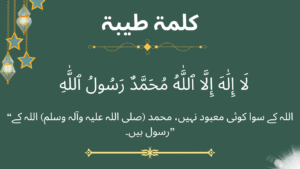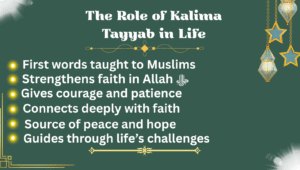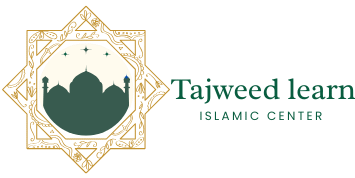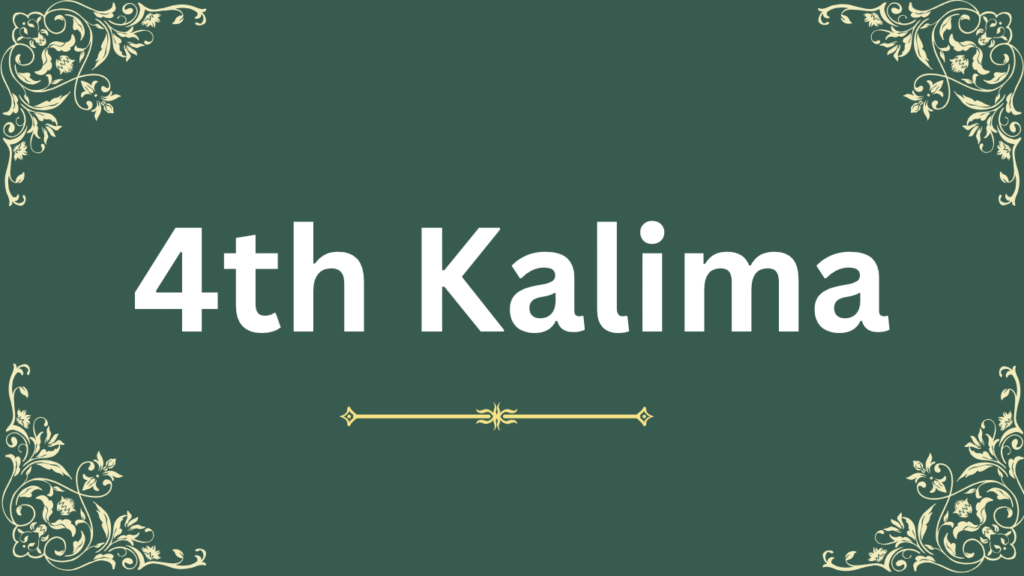When I first came across the 1st Kalima, it was more than just a phrase to memorize — it became the base of my faith. Known as Kalima Tayyaba or كلمات الطيبة, it reflects the purity and truth of Islamic belief. This popular and foremost part of Islam is taught early to every Muslim as the start of the five pillars.
The Kalima holds deep significance, not only as a fundamental truth but also as a spiritual pillar that defines our identity. We are taught to recite it frequently, making it part of our everyday spiritual routine. It’s learned, memorized, and practiced with devotion by Muslims worldwide.
When non-Muslims revert to Islam, their first act is to recite the Kalima Tayyaba or this
Kalima Shahadat. This symbolizes that the person has fully embraced and entered Islam with heart and intention. Saying these words marks a deep commitment to Allah سُبْحَانَهُ وَتَعَالَى and His Messenger, Muhammad ﷺ.

Pehla Kalma Tayyab in Arabic
Pehla Kalima Urdu Translation
Pehla Kalima English Translation
Pehla Kalima English Transliteration
Benefits of Reciting the Pehla Kalima
When and Where to Recite
The first Kalima is a powerful phrase that can be recited anytime and anywhere with no restriction. It is often the first thing a kid in a Muslim family learns at the beginning of life. Traditionally, kids are taught this Kalima along with other Kalimas in schools and Masjids, especially in South Asian countries.
Read More: Kalima Tamjeed
The Role of Kalima Tayyab in Life
Muslims are taught to recite the Kalima Tayyab from the early stages of their life and during times of difficulties or gloomy periods. Reciting it helps strengthen faith and belief in Allah سُبْحَانَهُ وَتَعَالَى, giving them courage and patience to face miseries. This practice connects believers deeply to their faith, especially when facing life’s challenges.

Spiritual Benefits and Tawheed
The Kalima Tayyab emphasizes Kalima Tawheed, which confirms the Oneness of Allah. It reminds Muslims that their life’s purpose is to promote obedience to Allah and follow His directives. This core belief shapes a Muslim’s actions and intentions, rooting their entire spiritual journey in submission to God’s will.
Benefits of the Kalima Tayyab Based on the Quran and Hadith
The Kalima Tayyab is the root of a Muslim’s belief and connection to Allah. Though the full phrase isn’t together in the Quran, La, ilaha, illallah, and Muhammad Rasulullah are found in different verses. Saying it with true heart and certainty shapes our faith.
Read More: astaghfar kalima
Power of the Kalima in Hadith
The Importance of Kalima Tayyaba
Foundation of Islamic Faith
The Kalima-e-Tayyaba is the base of faith for every Muslim, made of two parts. The first part shows the firm resolve of the reciter in worshiping Allah سُبْحَانَهُ وَتَعَالَى alone. This concept of monotheism is the foundation of Islam, basic and essential to every Muslim.
The Core Pillars Around the Kalima
Conclusion
The Kalima Tayyab is not just the entry point into Islam—it is the foundation upon which all other beliefs and actions stand. From its early teaching in childhood to its recitation at the time of death and also recite Kalima Shahadat, it stays with a Muslim through every phase of life. Its words, whether in Arabic, Urdu, or English, reflect the unity of God and the truth of His Messenger.





